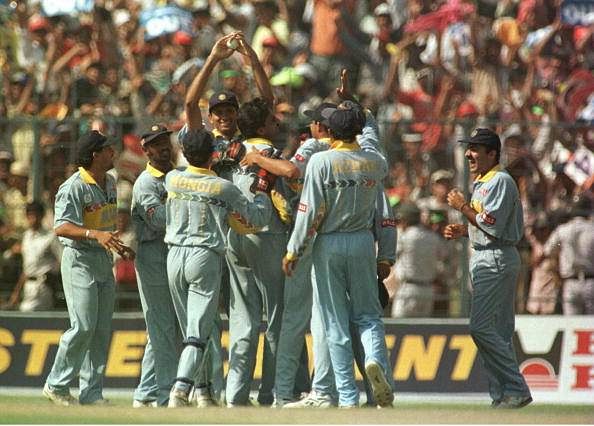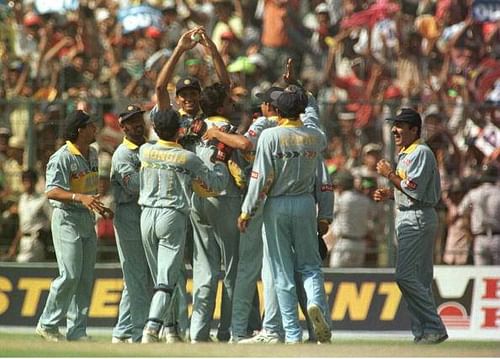
When Azhar's words, and not his bat, won India an ODI

There are few sports that occupy a special place in the collective hearts of the Indian masses. With the golden aura surrounding Hockey fading in the 70s and 80s, Cricket emerged. And slowly but surely the game captured not just the hearts and minds of a nation, but their imagination as well. It was but natural therefore, that the practitioners of the game achieved unparalleled stardom.
They became heroes, icon and idols. Their misgivings forgiven and their heroics worshiped. And when Kapil hoisted the Prudential World Cup in 1983, the country watched in awe while the feeling of invincibility emerged. More heroes emerged in the years succeeding the World Cup triumph. But there was one who would go one to script a tale of artistry, success, romanticism and controversy.
Mohammad Azharuddin – the wizard
Ever since he burst onto the international scene with three hundreds in his first 3 Test matches, the crowds loved Azhar and the commentators couldn’t hold back their affection towards his famed wrist-work. He was the quintessential small town boy who had risen to national prominence with his wizardry with the willow. By the mid-90s, having led India in two World Cups, his stature was legendary.
People were accustomed to the Hyderabadi walking out, flaying the bowling with utter disdain and departing after a thoroughly entertaining innings. And needless to say, it was always disappointing when he didn’t score. There was however, one incident when the crowds swallowed the anguish of his failure and obliged to his mass appeal. It was to be an incident that culminated in a dramatic run-chase, one that almost did not happen.
The Titan Cup was held in October 1996 on the back of Sri Lanka winning the World Cup earlier that year in March. Azhar had relinquished his captaincy and a 23-year-old Sachin Tendulkar was now at the helm. Australia and South Africa were superior teams – the former being beaten World Cup finalists and the latter having had a strong World Cup show followed by victory in the 1996 Pepsi Sharjah Cup. Coming into the game at Bangalore, South Africa had beaten both India and Australia in its previous outings. The game was therefore, a must win for the hosts and Australia.
Australia won the toss and posted 215 on the board – riding on the back of Mark Taylor’s maiden ODI hundred. The Indian run chase began and in no time, the hosts were reduced to 47/4. When Damien Fleming trapped Dravid before the stumps, the crowd began to grow uneasy.
The local lad had just broken into the national squad and the partisan crowd couldn’t bear the sight of one of their own being sent back. Subsequently, when SK Bansal adjudged Azhar LBW to a Gillespie off-cutter, the former skipper wasn’t pleased one bit. After holding his ground briefly and indicating an inside edge, he commenced his reluctant walk back to the hut with disappointment written all over his face.
It was at this juncture that the Western Stands at the Chinnaswamy Stadium erupted. Frustration was brewing when Dravid was sent back and when Azhar was given the marching orders by the umpires who seemed to waste no time in raising the “dreaded finger”, the crowd yelled foul-play. A huge roar was followed by loud booing. Moments later, the first wave of paper card banners started descending over deep mid-wicket.
Soon after, it rained water bottles and thereafter, anything that the crowds could get their hands on were being hurled onto the ground. Barely six months after that fateful Eden Gardens World Cup semi-final, history was repeating all over again.
Azhar to the rescue
The ball boys, while clearing the debris, pleaded with the crowds to stop. But the folks in the ground tier of the Western Stands weren’t giving in just yet. They had just witnessed what they were convinced was foul-play and they had seen enough of it. Meanwhile, the Aussies huddled around the pitch and began looking towards the dressing room. The visitors salivated at the possibility of a victory by “default” – a la Eden Gardens. The umpires, having learnt from previous experiences, now began to gesture frenetically towards the dressing rooms; imploring that someone come down and appease the raging crowd.
Then, it happened.
To everyone’s astonishment, Azhar strode out. Having taken his pads out but still in match attire, he emerged like a wounded warrior determined to restore parity. He headed straight to the troubled section and began waving his arms. Displaying trademark Azhar mannerisms of headshakes and shoulder nudges, the stalwart established a rapport with the crowd. It was almost as if he was saying, “stop this and we will win the game for you”.
The crowds loved to see him up close and when he walked up close to the fence, their anger was replaced with joy. There was almost a mini stampede as the crowd in the lower tier jostled for space and a close proximity view of the superstar. But it was worth it as they had Azhar at an arm’s length and he was speaking to them – one on one. It was more than what they had bargained for. They were here to watch India win, but they were bowled over by him instead.
Soon after, Azhar completed his perimeter march. The crowds waved back at him and relented. The magician had cast a spell that left a few thousand swaying to his tune. It seemed improbable that the game would resume just a few minutes ago – yet it did. And the rest as they say, is history. At a hopeless 164/8, Javagal Srinath and Anil Kumble joined hands with 52 runs still required off 8 overs.
They nudged and pushed their way towards the target. And when Srinath hit a towering straight six off Steve Waugh in the 47th over, the Aussie shoulders dropped in disbelief. An over later, Kumble scored the winning runs to send the crowds into raptures.
For his 88 runs, Sachin Tendulkar was awarded the man-of-the-match. But it was Azhar who really won hearts that night. The Indian crowds are passionate, vociferous and fanatical – all at the same time. To be able to come out and face them in adversity is akin to committing a crime and then walking towards a mob waiting to lynch you.
Roger Goodell, Commissioner of the NFL famously remarked, “No one is above the game or the rules that govern it. Respect for the game and the people who participate in it will not be compromised”. Azhar seem to evoke similar sentiments that night as he displayed bravery and compassion in equal measure. As a result, the game triumphed. Had it not been for his intervention, India would have forfeited an embarrassing second match in a year due to unruly crowd behavior.
For all his batting skills, Mohammad Azharuddin chose to act sans his willow and in doing so, saved the blushes of a country and restored faith to the ever demanding masses.